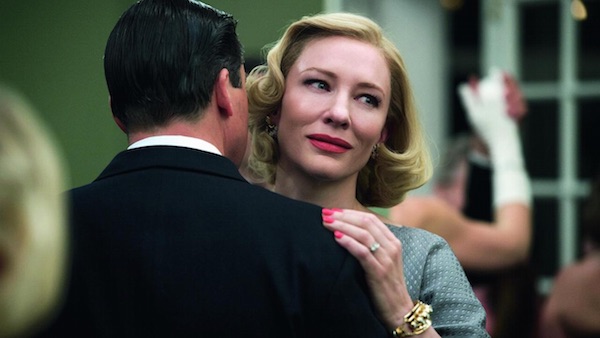Carol Review
You think you know what it is to want until you sit in stunned silence following two hours of Todd Haynes’ Carol.
It’s a film about so many things, probably the least of which is the sexual orientation of its two lead (yes, lead) characters, star-crossed lovers played expertly by Cate Blanchett and Rooney Mara. It’s about a time and place — Manhattan in the 1950s. It deals with desires and how such feelings can sometimes betray us, as well as indecision and timing, and how those can lead to both ecstasy and tragedy. And Haynes conveys it all to us by beautifully balancing a filmmaker’s passion with precision in a way that will sneak up on you and leave you shaken. No conversation about 2015’s best films is complete without a viewing of Carol.
Blanchett plays the title character, a wealthy wife and mother, but our window into this world is Mara’s Therese. She’s in a relationship with a young man named Richard (Jake Lacy), who’s not really doing much for her. She has a fine job at a department store, but she longs to do something with photography. She’s dissatisfied and restless, but very quiet about her troubles and seemingly content to just continue along the path she’s on for the time being, as uninspiring as it might be.
Carol represents a really appealing fork off that road. She comes into Therese’s workplace around Christmastime and asks for advice while shopping for a toy for her daughter. A glove is left behind, and an olive branch of friendship is eventually extended. As Therese spends more time with Carol, however, it becomes apparent that her home life is not everything her fur coat and seemingly charmed facade make it seem like. Her marriage with her husband, Harge (Kyle Chandler), is falling apart, and the more time Carol spends with Therese, the less likely she is to maintain custody of, or even visitation rights with, her daughter.
The film doesn’t move slowly, per se, but its characters reveal themselves to us in a very deliberate way. That means no major dramatic revelations or swerves; It also means Carol‘s brilliance might not make itself apparent to you until its closing scenes (assuming it does at all). A framing device, for instance, presents a chance encounter twice — once early, once late — and from different perspectives both times. It becomes so much more emotionally potent once we know everything that led to it. Phyllis Nagy wrote the film’s script, and it’s based on a novel by her late friend, Patricia Highsmith. Its dialogue is flawless, its characterizations are rich, and its structure is a perfect fit for Haynes style of filmmaking.
It’s not hard to view Carol as a companion piece to the director’s Far From Heaven. (Such a notion makes one long for a Haynes Cinematic Universe, as it were.) Both films present us with women who view the world as it should be, rather than as it is, and as such they get themselves into some personal trouble pursuing “immoral” matters of the heart. Haynes’ earlier film took place in a New England suburb and dealt with homosexuality very differently than Carol does. It’s interesting to ponder what Julianne Moore’s Cathy would think of Carol and Therese.
That film was also much more explicit with both its emotions and socio-political statements. Carol lives beneath the surface, almost exclusively. Only a few tears are shed, and most every romantic declaration is given by the eyes or hands. Haynes fetishizes these glances, knowing his actors need no help conveying their characters’ deepest desires and the degree to which they feel them. He and Nagy save plainspoken pronouncements for the few times the plot must turn, which are so few and far between that they mean so much more and hit so much harder when they actually happen.
Books can (and should) be written about the sparkling performances at the film’s heart because when I’m an old man and my grandkids ask me what happened in the movie world in 2015, I’ll tell them about Cate Blanchett and Rooney Mara. Hopefully I’ll be able to speak about how the latter won her first of many Oscars playing Therese, a slightly more complicated role than the one expertly, beautifully, and tragically inhabited by her world-class co-star. And the reasons for my preference are manyfold, but what struck me about Therese vs. Carol is the sexuality angle. Carol has been in homosexual relationships before. Her husband gives her some guff about this being a new tactic the first time he sees Therese in their home. But for Therese, she hasn’t felt this way before, and she doesn’t know what it means. She certainly doesn’t run from her feelings, but she only speaks of them aloud once or twice. Almost everything Mara does in Carol is through her eyes and her mannerisms, and yet, it feels like we know everything about this young woman.
Blanchett, meanwhile, gets to show off. And she’s the best actress in the world today, so that’s far from a bad thing, but she’s the more aggressive partner in her relationship with Therese, and as such, she’s more flirty and open. There’s also more holding her back. The film’s tragic barriers emanate almost exclusively from her personal life, so in almost every case, Carol acts and Therese reacts. It’s a fascinating dynamic that’s realized perfectly by two exquisite performers.
As exquisite as the acting is Edward Lachman’s cinematography and Carter Burwell’s score, among other craft achievements. The former relies on longer takes to navigate us through this repressed city and the personal lives of two of its citizens. The film’s palette is unique — almost like a pastel traffic light — and Lachman’s use of elements like rain and shadows is noteworthy. Burwell, meanwhile, has been near the top of my list of best working film composers for some time. His haunting score here might vault him to the top.
It’s not hard to imagine Carol‘s subtle sensuality and languid pacing failing to connect with certain moviegoers, but those who are down for something challenging — something old-fashioned yet forward-thinking, something with a soft interior and a hardened exterior, something that will affect you emotionally without displaying much raw emotion itself — will likely come away from Carol changed. It’s one for the all-timer list.
















Pingback: Reviews: Carol (2015) – Online Film Critics Society